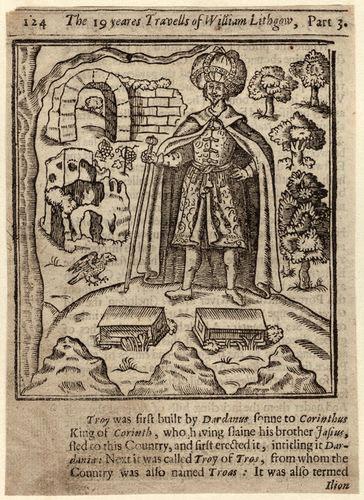
Best viewed in
Internet Explorer
PDF
Back to

Updated
07/10/2013 |
Wondering Willie

In
the early 17th century one of Scotland’s most original and romantic
travelers, William Lithgow (1585-1645), embarked on some extraordinary
travels following his involvement in a scandal with a Lanarkshire lass.
Thirty six thousand miles later he published his remarkable story in
The Totall Discourse of the Rare Adventures and Painefull Peregrinations
of Long Nineteene Years Travayles from Scotland, to the most Famous
Kingdomes in Europe, Asia, and Affrica
Many Scots regarded Lithgow’s tales with skepticism, which he refuted,
proclaiming his critics were ‘mere vomiters of venom’. Not everyone
dismissed his claims, the young James Graham, Marquis of Montrose was
captivated by his yarns of exotic kingdoms.
Willie started his great journey in Europe, where he claimed to have
walked the entire way from Paris to Rome, and on arrival in the city was
forced to flee to Naples to escape the clutches of the Inquisition. He
journeyed on through Italy to Venice via Loretto and Ancona with further
adventures en-route. He claimed that he was shipwrecked, robbed by
bandits, personally aided escaped prisoners and rescued several
distressed damsels along the way.
Onto Greece, where two kindly Venetians gave him funds to travel to the
Middle East and Jerusalem. On the road to Cairo his three Dutch
travelling companions died suddenly from wine-drinking, which left him
heir to all their possessions. He used his windfall to return home in
1613 via Sicily, Italy, Paris and London. Back in London he dazzled King
James VI of Scotland & I of England with his tales of exotic lands.
Unfortunately court life wasn’t for him and in the year 1614 he set off
on his travels again.
This time his first stop was Italy. From there he managed to fund
another trip onto North Africa by an opportunist theft of the rings and
purses from two duelists, who had just slain each other. He continued to
travel until he ran into trouble in Spain, where he was arrested on
suspicion of being King James's spy. After questioning and torture,
Lithgow was handed over to the Inquisition for further physical
punishment. He managed to survive the experience, but was left very
scarred and decided it was best to return home. On his arrival back in
England, he was sent to Bath for half a year to recover from his ordeal,
courtesy of the King.
After
recuperating, Lithgow returned to London whereupon he encountered the
Spanish ambassador. He used the opportunity to try and secure
compensation for the injuries inflicted by the Inquisition, but the
appeal did not impress the ambassador who refused any compensation. The
decision angered Lithgow who took his vengeance on the ambassador by
physically beating him. Lithgow landed a 9 week jail sentence for his
act.
In 1627, following the accession of King Charles I, William left London
for Scotland, where he saw his days out as a humble poet, recalling his
days of travel to anyone who would listen. |

